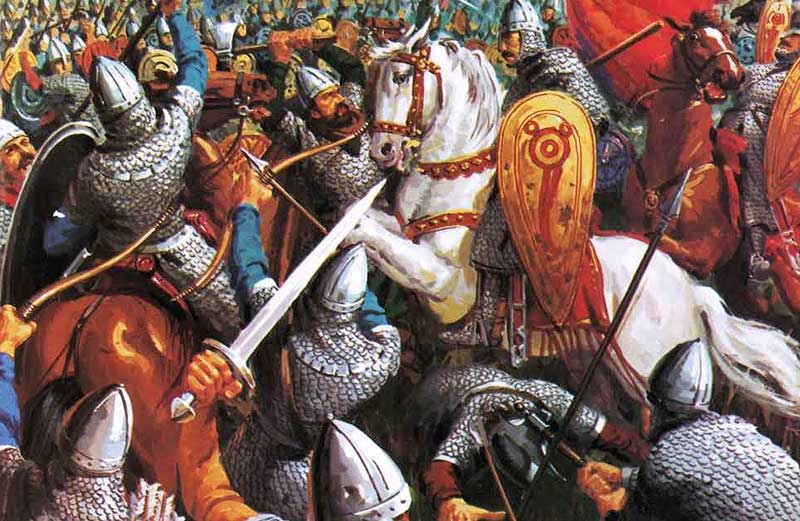 |
Robert le Dispenser, a tenant-in-chief of several counties, in the Domesday Book of 1086. Robert was possibly one of the Norman knights who fought alongside (or accompanied) William the Conqueror in the defeat of King Harold II of England at the Battle of Hastings in 1066.
There is little doubt that both Robert and his brother Urse came to England at about the time of the Battle of Hastings. They were both beneficiaries of William over the years, and were given titles and substantial land and property-suggesting repayment for some earlier deeds.
It is likely that Robert's first acknowledgment was his official appointment as Royal "Dispencier" sometimes expressed more grandly as "Royal Steward", "King's Steward" or "Lord Steward". As dispenser of provisions to the King and his household Robert was known and recorded as Robert le Despencer or, in its Latinised form, Robertus Dispensator. There is also the possibility that Robert held this official position before arriving in England.
Robert Despenser (sometimes Robert Despensator, Robert Dispenser, or Robert fitzThurstin; died after 1098) was a Norman officeholder and landholder in post-Conquest medieval England.
Despenser was the brother of Urse d'Abetot, who was sheriff of Worcestershire shortly after the Conquest. Despenser and his brother were originally from Normandy, and were tenants of the lords of Tancarville there. Despenser held the office of royal steward, or dispenser, under King William II. Despenser's surname derived from his office. Although Despenser was married, the name of his wife is not known for sure. He may be the Robert de Abitot referred to in a confirmation charter of King Stephen of England's, but this identification is not certain.
In 1086, Despenser was listed in Domesday Book as holding lands as a tenant-in-chief in Gloucestershire, Leicestershire, Lincolnshire, Oxfordshire, and Warwickshire, as well as holding lands in Worcestershire from the Bishop of Worcester.
Robert was still alive in 1098, as he restored some estates to Westminster Abbey, but likely died shortly thereafter. In Normandy, Robert was a benefactor to the Priory of St. Barbe-en-Auge, which had been founded by the Tancarville lords.
Legacy
Despenser appears to have had no legitimate male children, as his heir was his brother Urse. He may have had a daughter, as some of his lands were inherited by the Marmion family, but it is also possible that they acquired the lands via marriage with a daughter of Urse. Despenser's office as steward may also have gone to Urse, as later the office passed to Urse's heirs.The medieval writer Orderic Vitalis states that it was Despenser who gave Ranulf Flambard his surname of Flambard, which means torch-bearer or incendiary. This was applied to Flambard because of his overwhelming personality.Robert le Despencer, Round states that "Robert the Despencer", was the brother of "Urse de Abetot", who succeeded the former in his lands in Lincolnshire. The primary source is not cited, "Ingoluesmaera", being the same as "Gundelsmere", which was held by Robert in Domesday Book.
Domesday Book records "Robert Despenser" holding Childswickham in Gloucestershire [Worcestershire]; Knightwick in Worcestershire; and several properties in Leicestershire.
"...Robert, Dispensator..." witnessed the charter dated to [1086] which notified a plea held by William I King of England concerning William de Briouse and the abbey of Holy Trinity, Fécamp.
In the second half of the eleventh century, at the time of the Domesday Survey [1086], the one name most likely to send the chill of fear down the spine of everyone in the County of Worcestershire, young and old, rich and poor, was that of Urso the Sheriff, or simply Urso, or Urse as he was most generally known. Forceful, dynamic and resolute he certainly was."
Urse of Abettot, or of Worcester, was an Anglo Norman administrator and land holder in England during the time of the Norman dynasty
[1066-1135], who was especially important during the time of William II [William Rufus]. One of the most important positions he held was as sheriff of Worcestershire, for which he was appointed by the king.robertAt the time of Domesday Book in 1086 he was a tenant-in-chief in the counties of Hereford, Gloucester, Warwick, and Worcester, and also held other lands as a tenant lord. His tenancy in chief was the basis of the feudal barony Salwarpe.
According to Loyd, his first recorded occurrence in England is in 1067.However he is an example of a person in this generation whose family can be traced back to France with reasonable confidence.
Sanders reports that he was sheriff of Worcestershire from about 1069 until his death, and that he died in 1108.Keats-Rohan accepts the estimation of Sanders for the death date. It was in 1108 that he was succeeded in his lands and office by his son Roger.
Like many of the first Anglo-Norman sheriffs, and indeed secular lords before 1066, Urse was criticized by clerics for his incursions upon old church land rights. He is for example mentioned in "Hemming's Cartulary". William of Malmesbury recorded a rhyming curse made upon him by Ealdred, the Archbishop of York, for encroaching upon the cemetery of Worcester Cathedral priory: "Hattest thu Urs, haue thu Godes kurs" (you are called Urse, you have god's curse).
©peh
